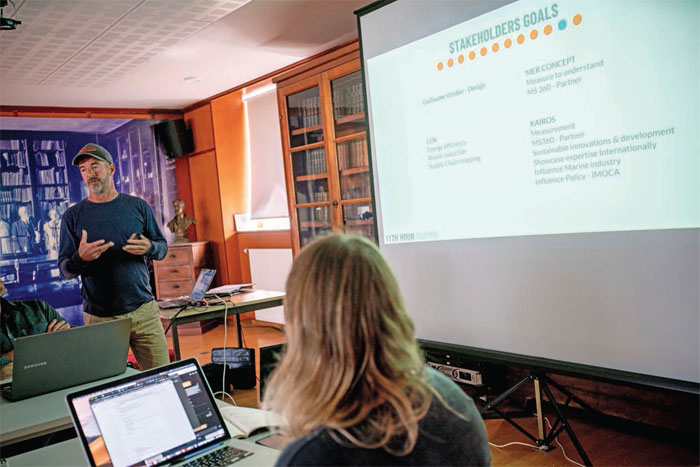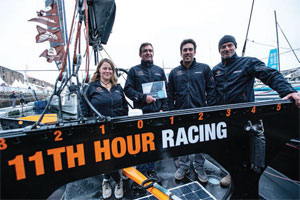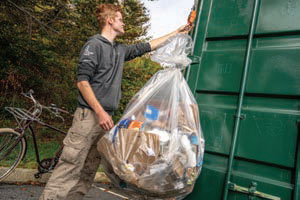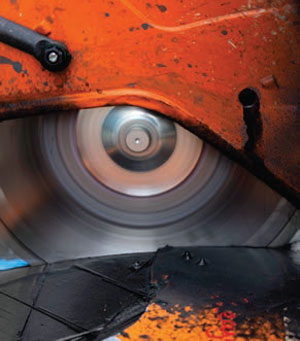
But where do we start, is the question often heard when a new sustainability initiative is discussed...
Sustainability is good for business. Customers expect it and so does the workforce, but where do you even start? It’s just got a whole lot easier with the launch of a free-to-use Sustainability Toolbox designed specifically for the marine and sports sectors by 11th Hour Racing Team.
‘We have a team working full time to develop solutions on how to innovate and build boats in the most sustainable way,’ says 11th Hour Racing Team’s skipper, Charlie Enright. ‘We’re sharing this knowledge and experience by publishing The Toolbox to make the sustainable transition as accessible to as wide an audience as possible. ’
Until now, scoping out, setting up and implementing a sustainable business strategy has been a big challenge even for large corporations with deep pockets and in-house sustainability teams. For smaller businesses like most involved in sailing, it’s been nigh-on impossible. Now that a full set of step-by-step guides, practical information and relevant resources is freely available, it’s much quicker and far easier to get up to speed, identify simple wins and start making informed decisions.
What about performance? For racing teams and their suppliers, the need to squeeze every last hundredth of a per cent of advantage out of everything they do has long been a handy excuse for unsustainable behaviour. Not any more though. 11th Hour Racing Team is on a mission to prove that sustainable sailing can win the world’s toughest ocean races and, with support from the Imoca Class Association, three other top sailing teams are already following in their wake.
11th Hour Racing Team is among the few sailing teams that have a full-time sustainability department. To manage the interface between performance and sustainability, pro sailor Damian Foxall – a veteran of 10 round-the-world races – has for now hung up his sea-boots (but not his windsurfing wetsuit) to work with sustainability expert Amy Munro. ‘The most leverage we have is our dollar spend,’ Foxall says. ‘There is no better way to influence and encourage sustainable change.'
Munro and Foxall are mapping the complex web of marine industry supply chains, assessing suppliers with a “stakeholder discovery” process and researching, measuring and documenting every aspect of the team’s four-year campaign to win the next Ocean Race. That includes building a next-generation Imoca at CDK in Brittany, France – the first ever to be optimised for The Ocean Race, rather than the Vendée Globe – while producing a comprehensive set of case studies for The Toolbox. Whether you’re wondering how to reduce carbon fibre waste, sourcing sustainable textiles for team t-shirts or maximising the efficiency of workshop space, Foxall and Munro have established a benchmark.
‘Everything we do has sustainability embedded at its core,’ Foxall says, ‘but it’s an ongoing voyage. Our initial target of a neutral footprint is no longer enough. We need to be aiming for a net positive footprint - leaving a restorative, regenerative impact in our wake.’
The sustainability programme now ‘applies to all of our activities everywhere,’ he says. ‘Two of the three pillars of sustainability are social and economic – you can’t have environmental health without them.’ This is reflected in the team’s mission statement: vibrant, healthy oceans and communities supported and inspired by the sport of sailing. Diversity, Foxall says, is another area that the traditionally white male sport of sailing needs to urgently address.
He cites Italian hydraulics maker Cariboni as a good example of social sustainability. ‘They go to great lengths to support their workforce and are deeply involved with their local community,’ he says. ‘And they have also described other efficiencies such as their waste recycling, but they hadn’t specifically considered this in the terms of a sustainability plan. Like many companies, sustainability is already integral to their good business practices and forms a good base to build from.’
Musto, meanwhile, has been spurred on by its partnership with 11th Hour Racing Team to develop more sustainable clothing with a circular mindset that minimises the environmental footprint, due to be released later this year.
Building a new boat inevitably generates a lot of waste, which 11th Hour Racing Team could have avoided by refitting a used Imoca . But that misses the whole point of this project: to establish muchneeded sustainability benchmarks for new builds of racing yachts, for a very wide range of components and equipment, and for running a grand prix yacht racing team.
‘This is about working from the inside of the industry,’ Enright says. 'Is there some low-hanging fruit? Certainly. Are there some elements of the build process that aren’t ready for a sustainable approach today? Yes. But this is a lot more than just a boatbuilding project. It’s about the overall team operations, our travel footprint and a million small choices.’
‘Working with CDK and the Imoca Class, we've started collaborating via the Brittany sailing hub to increase the amount of carbon fibre that gets recycled,’ Foxall says. ‘Even for the bigger boatyards, the amount of waste they produce is commercially non-viable for recycling. So we’re collaborating within the marine sector to combine or create at scale circular material flows.’

Above: 11th Hour Racing Team sustainabilty officer Amy Munro, race team skipper Charlie Enright, CEO Mark Towill and sustainability programme manager Damian Foxall.
Beyond their own build project, Munro and Foxall are trialling The Toolbox with pilot partners including the Imoca Class Association and three of its racing teams, plus The Ocean Race and SailGP. ‘It was really important for us to build The Toolbox alongside our community, to ensure it is useful and applicable to a broad set of organisations,’ Munro says.
In their broader remit of applying circular economy principles to the design and build of sailing yachts, Munro and Foxall have also formed a working group of experts focused on “designing out” waste, recycling carbon, life cycle assessment and biomimicry, with input from the Paris Industrial Design School and scientists from Station Marine Concarneau in France.
Recycled carbon is inevitably downcycled to some extent, Foxall explains. The usual method is to grind it down, reweave it and make it into chopped strand mat, with unaligned fibres, and the leftover strands of carbon that are too short can be milled into fine powder. ‘Two new techniques make it more useful,’ Foxall says. ‘One process uses water jets to realign the fibres and you end up with a really good product. The other way involves teasing out the fibres and putting them through a roving machine. We are currently working on a pilot project with Lineat Composites, a spin-out from the University of Bristol, UK, and sending them our carbon waste and, using their new HiPerDif technology, they are giving us carbon tape in return to use on the new boat build’.

Above: Cullen Zelenka a sustainability intern in Newport, Rhode Island weighs waste before recycling.
Below: the team’s carbon waste has been cut up and sent to the University of Bristol, UK, for a pilot project to recycle and return as carbon tape for the team’s new boat build

Biomimicry is already used in boats, Munro explains – Nomex honeycomb is a good example – and she has been testing emerging technologies. One of these is PowerRibs, a flax reinforcement grid inspired by leaf veins which the team is looking to use to build components with bioresin and recycled carbon. Another new application is carbon tape produced via the water jet recycling process described above.
‘The Imoca Class is really enabling this approach,’ Munro says. ‘They are implementing a framework to incentivise using sustainable materials, renewable energy and life cycle assessment.’ The Class association has its own sustainability team, plus a sustainability committee made up of racing team managers and boat captains, comms and logistics experts, naval architects, key boatbuilders such as CDK and Multiplast, along with Munro, Foxall and members of Imoca’s own calculations team. ‘We aim to encompass the whole industry,’ says Imogen Dinham-Price, an Imoca Class sustainability manager.
‘The next draft of the Class rules will encourage teams to start looking beyond carbon fibre,’ she says. ‘This will encourage teams to use noncarbon alternatives for removable parts: non-structural components that are not measured in the 90° stability test, like a chart table or 11th Hour Racing Team’s flax fibre hatch cover. We’re not saying you can’t use carbon; we are encouraging the use of other materials.’
Sustainability metrics have also been written into Imoca Class rules. From now until 2025, every new boat and all new structural components (such as foils) for existing boats must undergo life cycle assessment. In 2025 the Class will start imposing limits on the carbon footprint of new Imoca builds. To help sailing teams with all of this, Dinham-Price and her colleagues are integrating 11th Hour Racing Team’s Toolbox into the Class. ‘We’re trialling it first with three of the teams,’ she says.
The appetite for sustainable boatbuilding is certainly there. ‘CDK has offered the life cycle assessment process to their other Imoca clients and every one of them has taken up the offer,’ Enright says. ‘And we’ve already been asked by another racing team if they can use our moulds. A legacy of sustainability is part of everything we do.’
Click here for more information on The Toolbox »
Click here for more information on the 11th Hour Racing Team »
We invite you to read on and find out for yourself why Seahorse is the most highly-rated source in the world for anyone who is serious about their racing.
To read on simply SIGN up NOW
Take advantage of our very best subscription offer or order a single copy of this issue of Seahorse.
Online at:
www.seahorse.co.uk/shop and use the code TECH20
Or for iPad simply download the Seahorse App at the iTunes store


